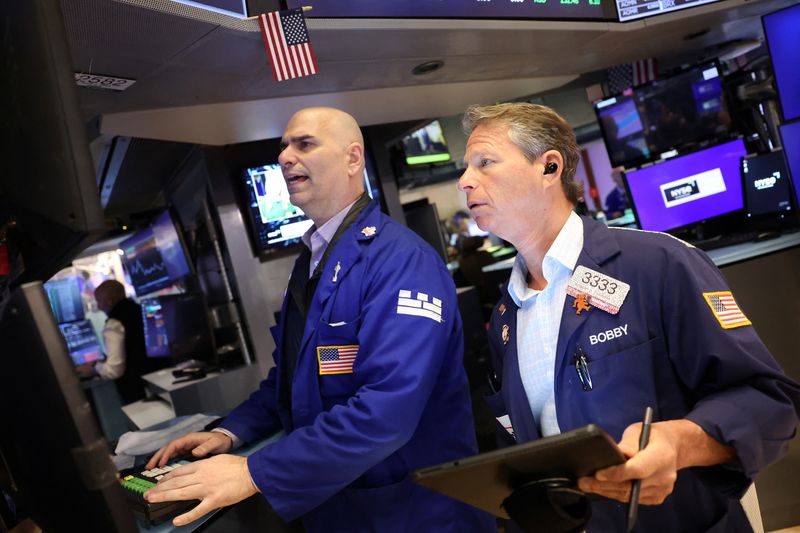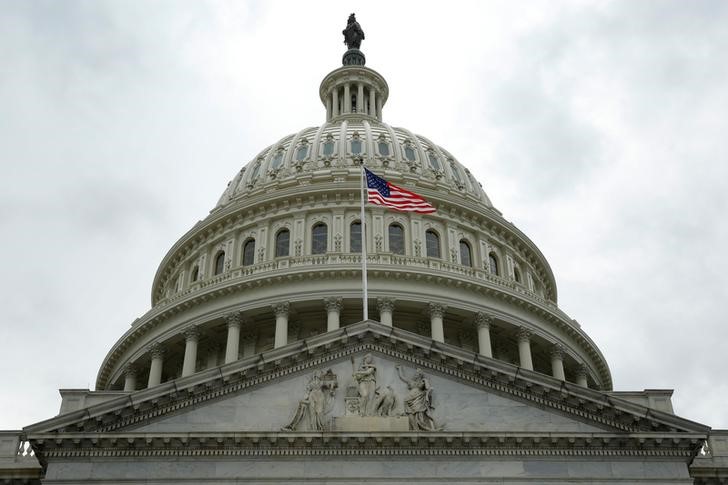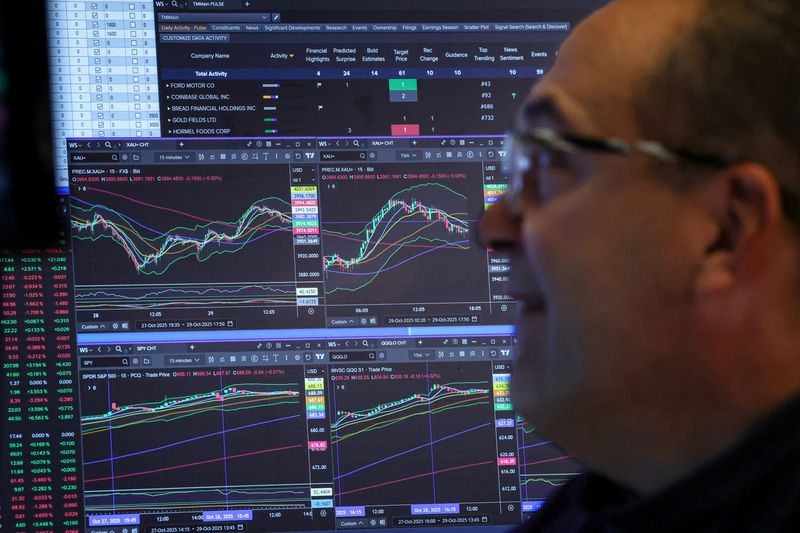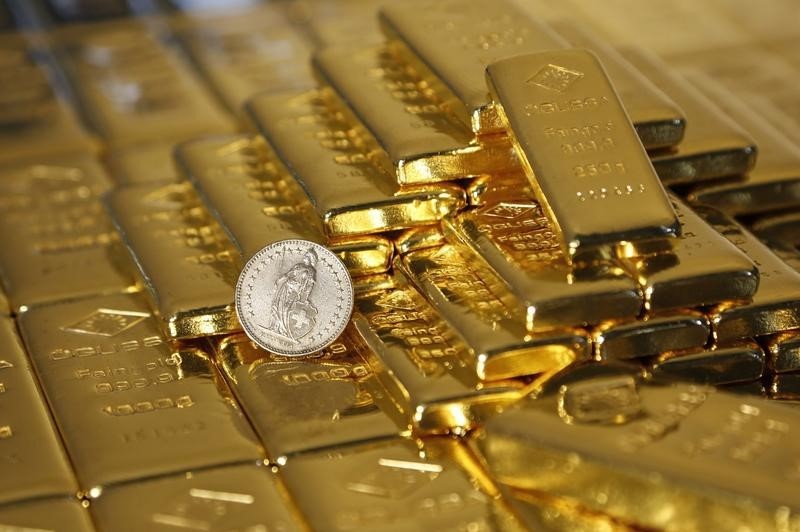Select Language

U.S. stock futures edge down after solid corporate earnings and economic data helped to soothe concerns around high stock valuations. Some members of the U.S. Supreme Court’s conservative supermajority express skepticism about the White House’s use of emergency economic powers to impose aggressive tariffs. Qualcomm warns that it could lose some business from a major customer, while Tesla shareholders are set to hold a vote on a $1 trillion pay package for CEO Elon Musk.
1. Futures inch lower
U.S. stock futures pointed lower on Thursday, following a rebound in the prior session after worries around elevated stock valuations hit equities earlier in the week.
By 02:27 ET (07:27 GMT), the Dow futures contract had slipped by 42 points, or 0.1%, S&P 500 futures had fallen by 7 points, or 0.1%, and Nasdaq 100 futures had declined by 47 points, or 0.2%.
The main averages on Wall Street climbed on Wednesday, with mega-cap technology stocks in particular notching gains. The uptick helped to tamp down emerging fears over the sustainability of heightened stock valuations, especially in the artificial intelligence-driven tech sector.
Bolstering sentiment as well were alternative data sources which suggested that U.S. economic conditions remained solid in October. Officials and policymakers alike have been starved of official figures during an ongoing government shutdown that has dragged on for more than a month.
Media reports suggested that lawmakers in Washington could forge an agreement to end the shutdown by this weekend. Should it linger on, Transportation Secretary Sean Duffy has warned, air travel capacity at 40 major American airports will be reduced by 10% from Friday.
2. Supreme Court shows skepticism on IEEPA tariffs
Meanwhile, markets were highlighting a note of skepticism among members of the U.S. Supreme Court’s conservative supermajority toward President Donald Trump’s use of emergency economic powers to impose sweeping tariffs.
On Wednesday, the high court began hearing oral arguments on Trump’s usage of the 1977 International Emergency Economic Powers Act, or IEEPA, as legal backing for the levies. The matter has been brought before the Supreme Court after lower courts ruled that the president had surpassed his authority by employing the measures.
Some debate has swirled around whether the court’s 6-3 conservative supermajority, which includes three Trump picks, will ultimately choose to strike down or uphold the IEEPA tariffs. For much of Trump’s second term in office, the Supreme Court have broadly supported the White House’s efforts to centralize decision-making powers in the executive branch.
For that reason, sharp questioning of IEEPA’s application to the duties by Chief Justice John Roberts was met with some surprise. The tariffs represented a tax on Americans, Roberts argued, adding "that has always been the core power of Congress."
Bets that the tariffs will survive the fall dropped in prediction markets, although analysts at Vital Knowledge flagged that, if the levies are not upheld, investors could be looking at a more uncertain economic landscape. Trump officials have also hinted that they could take advantage of other legal means to keep the president’s trade war going.
3. Qualcomm flags possible loss of Samsung business
Shares of Qualcomm sank by more than 3% in extended hours trading after the chip designer unveiled that it may lose some business from top customer Samsung Electronics next year.
The announcement overshadowed current-quarter sales and profit forecasts from the chip designer that surpassed Wall Street expectations thanks in large part to demand for premium smartphones. Qualcomm is a major global supplier of the modem chips which help connect these devices with wireless data networks.
Partially fueling these sales has been Samsung, which uses the chips in its Galaxy S25 model phones. However, CEO Cristiano Amon said Qualcomm is now preparing for the chips to make up a lower share of Samsung’s next-generation versions of the handset, Reuters reported.
Elsewhere, fellow chip technology provider Arm Holdings’ fiscal third-quarter outlook surpassed estimates as well, buoyed by heavy recent AI spending throughout the tech industry. Shares of the U.K.-based group rose after-hours.
4. Tesla shareholder vote ahead
Tesla shareholders are expected to decide today on a massive compensation package for CEO Elon Musk, with at least one major stakeholder having already outlined plans to vote against the measure.
Earlier this week, Norway’s sovereign wealth fund -- and the world’s largest -- said it would reject the roughly $1 trillion pay package Tesla has put forward for Musk, citing concerns over the scope and effect of the award.
Norges Bank Investment Management, which manages the $1.9 trillion fund, said that while it "appreciate[s] the significant value created under Mr. Musk’s visionary role" at the helm of the electric carmaker, "we are concerned about the total size of the award, dilution, and lack of mitigation of key person risk."
But Tesla’s board has flagged that should shareholders say no to the compensation, there is a risk that Musk -- the world’s richest man -- will leave the company, potentially pushing down its stock price.
5. BoE decision
While last week’s Federal Reserve interest rate cut, as well as policy holds by the European Central Bank and Bank of Japan, were widely anticipated, the Bank of England’s announcement later today is far from certain.
Markets are projecting that the BoE will keep rates steady, although there was still a roughly one-in-three chance that the central bank will ease borrowing costs by a quarter of a percentage point.
Leaving rates unchanged would be the first slowing in a cycle of policy loosening which began last year, but some analysts now expect a possible drawdown because of recently softer-than-expected -- albeit relatively elevated -- consumer price inflation and wage data.
The BoE has consistently slashed rates every three months since August last year, yet it is now unclear if it will maintain this pace, with Governor Andrew Bailey saying in September that the path ahead is "more uncertain."

Gold prices rebounded in Asian trading on Wednesday as a broader risk-off mood across global financial markets lifted bullion’s safe-haven demand, while traders await U.S. private payroll data for cues on future interest rate cuts.
Spot gold rose 0.9% to $3,966.56 per ounce by 00:47 ET (05:47 GMT), while U.S. Gold Futures edged up 0.3% to $3,974.10.
The metal declined nearly 2% in the previous session, hitting a one-week low.
Market bubble fears boost gold’s haven demand
Investor nerves were rattled after the CEOs of Morgan Stanley and Goldman Sachs flagged the possibility of a sharp equity market drawdown, pointing to richly valued stocks and “bubble” like dynamics in the tech-led rally.
Their remarks led to steep overnight losses on Wall Street, also dragging Asian equities lower on Wednesday.
Market jitters revived demand for gold, traditionally viewed as a safe store of value during times of financial stress.
Despite Wednesday’s uptick, bullion remains under pressure from waning bets on another U.S. Federal Reserve rate cut this year. Traders have scaled back expectations for a December cut after Chair Jerome Powell signaled last week that policymakers may pause further easing.
A resilient U.S. dollar, which hovered near a three-month high, has also weighed on gold by making it more expensive for overseas buyers.
At the same time, easing U.S.-China tensions have reduced safe-haven inflows, limiting gold’s upside momentum in recent sessions.
Investors are now turning their attention to the U.S. ADP National Employment Report due later on Wednesday for fresh clues on the labor market and future Fed policy moves. With official economic releases delayed due to a partial U.S. government shutdown, the ADP data is expected to take on added significance.
Metal markets edge up
Other precious and industrial metals edged higher on Wednesday, as a slight fall in the U.S. dollar aided gains.
Silver Futures rose 0.4% to $47.49 per ounce, while Platinum Futures edged up 0.2% to $1,542.75/oz.
Benchmark Copper Futures on the London Metal Exchange gained 0.4% to $10,6980.20 a ton, while U.S. Copper Futures climbed 0.9% to $4.97 a pound.

Gold eked out modest declines in Asian trading on Tuesday, pressured by a stronger U.S. dollar and lingering uncertainty over the Federal Reserve’s next policy move after Chair Jerome Powell’s hawkish tone last week.
Spot gold fell 0.4% to $3,986.10 per ounce by 01:58 ET (06:58 GMT), while U.S. Gold Futures declined 0.5% to $3,994.30.
The metal has struggled to hold above the $4,000 mark as the dollar extended gains, making bullion more expensive for overseas buyers.
Gold pressured by stronger dollar, Fed rate ambiguity
The dollar climbed to a three-month high against major currencies on Monday, underpinned by fading bets of another rate cut this year.
Powell last week signaled that the central bank is not yet committed to further easing, saying a December move was “not a foregone conclusion." Markets have since scaled back expectations of a near-term rate reduction.
Adding to the uncertainty, several Fed officials on Monday voiced competing views on the economy. Some policymakers emphasized the need for vigilance against inflation, while others pointed to signs of slowing labor-market momentum.
The split reinforced doubts about how soon the Fed might resume cutting rates, keeping the dollar supported.
Gold, which yields no interest, tends to lose appeal when rates stay high or the dollar strengthens. The prospect of fewer rate cuts and higher real yields has weighed on investor demand.
Still, analysts said the metal’s downside remains limited by fragile U.S.-China trade relations.
Recent signs of progress between Washington and Beijing have calmed markets, but renewed concerns over advanced chip exports have eroded the optimism.
Metal markets drop
Other precious and industrial metals traded much lower than gold as a stronger dollar weighed.
Silver Futures dropped 1.5% to $47.315 per ounce, while Platinum Futures fell 1.3% to $1,557.85/oz.
Benchmark Copper Futures on the London Metal Exchange slipped 1.3% to $10,705.20 a ton, while U.S. Copper Futures also declined 1.3% to $4.99 a pound.

The non-release of official U.S. labor market figures because of an ongoing federal government shutdown looms over the new trading week, along with the Supreme Court, which is expected to hear arguments on the legality of sweeping U.S. tariffs. Advanced Micro Devices and Palantir are set to report their latest quarterly returns, while the outcome a Bank of England interest rate decision is somewhat uncertain.
1. U.S. data blackout continues
Attention now turns to the ongoing U.S. government shutdown, which is flirting with becoming the longest such closure in American history.
Crucially, the shutdown has left investors without a range of critical data points needed to suss out the state of the U.S. economy. Although a reading of inflation for September was released late last month, separate key measures of job growth have not been published.
Federal Reserve policymakers have also been left without data normally used to calibrate interest rates, a fact that has contributed to a muddled outlook for borrowing costs over the rest of 2025. Following a 25-basis point drawdown in rates last week, Fed Chair Jerome Powell suggested that officials could become more cautious about further cuts should it face a dearth of job and inflation reports.
The trend could continue this week, depriving markets of the latest nonfarm payrolls report, an all-important gauge of employment in the world’s largest economy that is typically released on the first Friday of every month. A tracker of job openings and labor turnover is also set to be postponed.
Despite a recent raft of consequential events -- most notably, the Fed decision, high-profile mega-cap tech sector earnings, and crunch trade talks between the U.S. and China -- the shutdown has partially left investors without a roadmap for the final two months of the year, analysts at Vital Knowledge said in a note. "[I]n some ways, people are feeling even more confused than before," they added.
On Friday, the Wall Street Journal reported that lawmakers in Washington were making some progress toward a deal to end the shutdown, although President Donald Trump’s demand that Republican senators effectively bypass Democrats in the chamber to reopen the federal government has cast doubt over these discussions.
2. Supreme Court to hear arguments on legality of Trump tariffs
Trump’s sweeping tariff policies could once again come to the forefront this week, when the Supreme Court hears arguments around the legality of the levies.
The case has been brought before the Supreme Court after lower courts ruled that the president had surpassed his authority by employing emergency federal measures to enact the elevated tariffs on a slew of countries.
Whether the court’s 6-3 conservative majority finds in favor of the Republican president’s use of the 1977 International Emergency Economic Powers Act, or IEEPA, is unclear, although the Supreme Court has repeatedly sided with Trump in other key decisions so far this year.
Trump is the first U.S. president to employ IEEPA as legal backing for tariffs, citing a $1.2 trillion U.S. goods trade deficit in 2024 as well as American deaths from the painkiller fentanyl.
Should the tariffs be struck down, Trump would be left without a tool he has utilized in negotiations with foreign nations throughout his second term in office.
3. AMD earnings ahead
On the earnings calendar, Advanced Micro Devices is set to be the latest artificial intelligence chipmaker to report its latest quarterly results following an intense round of AI dealmaking.
According to Reuters, the U.S. Department of Energy created a $1 billion partnership with the semiconductor group last month to construct two supercomputers necessary to address large scientific problems like cancer treatments and national security.
Meanwhile, AMD has said it would supply AI chips to OpenAI as part of a multi-year deal that would both generate billions of dollars in annual revenue and grant the ChatGPT-maker access to about a 10% stake in the firm.
Yet the deal joined a host of similarly-circular arrangements which have fueled concerns around the possible emergence of an AI bubble reminiscent of the dotcom boom in the late 1990s. Such deals have become increasingly more common, driven by the AI industry’s need to fund and expand computing power to meet ever-rising demand for cutting-edge AI models.
Executives at AMD, a major rival to AI-darling Nvidia, said the OpenAI agreement was "certainly transformative" for both the business and the wider AI industry.
Shares of AMD, which is expected to report after the closing bell on Wall Street on Tuesday, have soared by more than 112% so far this year.
4. Palantir to report
Data analytics giant Palantir Technologies is also slated to report this week, with the returns due out after markets close on Monday.
In August, the company, whose operations also involve software for the the defense sector, lifted its full-year revenue forecast for the second time in 2025, citing strong demand for its AI-linked services from both businesses and governments.
A Trump administration focus on bolstering national security, as well as a change in Pentagon purchasing plans toward commercial and "non-traditional" suppliers, has further boosted the group.
Shares of Palantir have more than doubled so far this year, reflecting investor wagers that the firm will be at the forefront of the AI boom and a major beneficiary of increased U.S. spending on defense-related technology.
Palantir is anticipated to post third-quarter operating profit of $255.6 million on revenue of $1.09 billion, according to Bloomberg consensus estimates.
5. Bank of England decision
While last week’s Fed rate cut and European Central Bank and Bank of Japan policy holds were widely anticipated by markets, the Bank of England’s announcement later this week is far from locked in.
Markets are now anticipating that rates will remain unchanged at the BoE this week, although there was still a roughly one-in-three chance that the central bank will ease by a quarter of a percentage point.
Leaving borrowing costs steady would mark the first slowdown in a cycle of policy loosening which began last year. But some analysts now anticipate a potential drawdown because of recently softer-than-expected -- albeit relatively elevated -- consumer price inflation and wage data.
The BoE has consistently slashed rates every three months since August last year, yet Governor Andrew Bailey said in September that the path ahead is "more uncertain."

Wall Street futures were slightly lower on Thursday as investors assessed the Federal Reserve’s remarks, Big Tech earnings, and a newly announced U.S.–China trade deal.
The Fed delivered the expected quarter‑point cut on Wednesday, but flagged gaps in official data amid the federal shutdown, which could impact its future decisions. Chair Jerome Powell said policymakers may turn more cautious if jobs and inflation data stay scarce.
Powell’s comments prompted traders to unwind some bets on another similar-sized move at the Fed’s December meeting to about 70% from 90% earlier this week.
Investors digested a mixed set of Big Tech earnings, with Meta Platforms falling 8.8% in premarket trading and Microsoft slipping 2.6% on concerns of mounting spending on AI.
The Instagram-parent stunned investors with a near $16 billion one-time charge that gutted its third-quarter profit. It also flagged 2026 capex as "notably larger" next year.
Microsoft cautioned that capital expenditures will increase this year, reversing its earlier forecast of moderation.
In contrast, Alphabet jumped 7.2% after strong AI demand powered better-than-expected quarterly results.
"Megacap earnings and the AI theme should be dominant factors for the S&P 500 and risk assets. It would take a very strong hawkish shift in Fed rate expectations to derail the risk asset rally," said Ryan Wang, U.S. economist at HSBC.
Heavier spending signals from all three companies, combined with stretched valuations and a hawkish Fed tone, have prompted investors to pause after record peaks.
Among other earnings-related moves, Chipotle Mexican Grill tumbled over 19% after the burrito chain axed its annual sales forecast, with tariffs and inflation squeezing margins.
Markets will also turn to upcoming results from other ’Magnificent Seven’ members Apple and Amazon, due later in the day.
Nvidia’s march to the $5 trillion milestone helped Wall Street’s main indexes notch record highs in the previous session before Powell’s comments tempered some rate-cut expectations.
At 06:47 a.m. ET, Dow E-minis were down 153 points, or 0.32%, S&P 500 E-minis were down 5.25 points, or 0.08% and Nasdaq 100 E-minis were down 31 points, or 0.12%.
TRADE DEAL MADE, DETAILS AWAITED
U.S. President Donald Trump claimed a breakthrough with Chinese counterpart Xi Jinping on rare earths and tariffs after a nearly two-hour meeting on Thursday. Trump agreed to roll back some tariffs on Chinese imports in exchange for Beijing resuming soybean purchases, keeping rare earth exports flowing, and cracking down on fentanyl trafficking.
China agreed to pause export controls on rare earths that would last for a year, the country’s commerce ministry said in a statement.
Shares of rare earth miners rose, with MP Materials up 3.3%, USA Rare Earth advancing 4.7% and Critical Metals rising 6.7% in premarket.

Gold prices rose in early U.S. trade on Wednesday as market participants look forward to an expected Federal Reserve rate cut later in the day.
Spot gold edged up 1.8% to $4,024.42 per ounce as of 06:43 ET (10:43 GMT), while U.S. Gold Futures edged down 1.4% to $4,038.01.
The yellow metal slipped sharply in the last two days, reaching its lowest level since early October.
Fed decision on tap; Trump’s Asia visit in focus
The Fed’s two-day policy meeting, which began on Tuesday, is widely anticipated to culminate later in the day with a 25-basis-point rate cut.
While lower interest rates normally support gold, investors are placing particular weight on the forward guidance from policymakers.
If Fed Chair Jerome Powell signals that further cuts may be delayed or inflation remains a concern, higher real yields or a firmer dollar could dampen gold’s appeal.
Gold has been pressured by positive developments in U.S.-China trade. A framework agreement between Beijing and Washington over tariffs and rare-earth export controls has raised hopes of a thaw.
Additionally, U.S. President Donald Trump said he expects to cut the 20 % tariff on Chinese imports tied to fentanyl precursor chemicals ahead of his scheduled summit with Xi Jinping in South Korea on Thursday.
After a visit to Tokyo, Trump arrived in South Korea on Wednesday for a summit in Gyeongju with South Korean President Lee Jae‑Myung.
These signals of easing trade and geopolitical risk tend to reduce demand for safe-haven assets like gold, contributing to the recent pull-back from record highs.
Metal markets subdued
Other precious and industrial metals were also subdued on Wednesday as investors squared positions ahead of the Fed decision.
Silver Futures edged 2% higher to $48.27 per ounce, while Platinum Futures gained 1.5% to $1,608.65/oz.
U.S. Copper Futures gained 0.9% to $5.22 a pound.

Amazon said on Tuesday it will reduce its corporate workforce by about 14,000 roles, as the tech giant cuts down on operational layers to limit costs amid ballooning investments in artificial intelligence.
The company had about 1.56 million full-time and part-time employees at the end of last year. Amazon’s corporate workforce includes roughly 350,000 employees.
Reuters first reported on Monday that Amazon is planning to cut as many as 30,000 corporate jobs beginning on Tuesday, as the company compensates for over-hiring during the peak demand of the pandemic.
Amazon has been restructuring its workforce across multiple divisions in recent months, with piecemeal job cuts across its books, devices and services unit, as well as its Wondery podcast division.
CEO Andy Jassy said in June growing adoption of generative AI tools would reduce total corporate workforce at the e-commerce giant in the next few years.
Corporations are increasingly using AI to write code for their software and adopting AI agents to automate routine tasks, as they look to save costs and cut reliance on people.

U.S. stock futures rose Monday, extending last week’s rally, as investors cheered growing expectations of a Federal Reserve rate cut and encouraging signs of progress in U.S.-China trade negotiations.
At 05:35 ET (09:35 GMT), Dow Jones Futures traded 300 points, or 0.6%, higher, S&P 500 Futures gained 62 points, or 0.9%, and Nasdaq 100 Futures jumped 345 points, or 1.4%.
All three of the main stock indices posted record closing highs on Friday, fueled by cooler-than-anticipated inflation data, which reinforced expectations that the Fed will opt to slash interest rates at its two-day meeting.
Fed meeting looms; U.S.-China trade talks progress
Investor sentiment strengthened after data last week showed that U.S. consumer prices cooled more than expected in September, reinforcing bets that the Fed will cut rates at its two-day policy meeting concluding on Oct. 29.
The softer inflation print cemented expectations of a 25-basis-point cut, with markets now watching closely for signals on whether the central bank could ease further in the coming months.
"We continue to look for a 25bp rate cut [on Wednesday], with a further 25bp move in December and 50bp of cuts in early 2026," ING analysts said in a recent note.
Adding to the upbeat tone, U.S. and Chinese officials reached a “framework understanding” on key trade issues over the weekend at the ASEAN Summit in Kuala Lumpur.
Treasury Secretary Scott Bessent said both sides had agreed to defer fresh tariff threats and pause China’s planned restrictions on rare earth exports. The breakthrough sets the stage for U.S. President Donald Trump and Chinese President Xi Jinping to meet later this week to finalize an agreement.
“I think we’re going to have a deal with China,” Trump told reporters on Sunday.
Li Chenggang, China’s lead negotiator, said a "preliminary consensus" had been notched following a round of "candid and in-depth discussions."
Investors took these comments as signs that months of tariff tensions may finally ease, a development that has buoyed risk assets globally.
Big tech earnings in focus
Elsewhere, investors will also focus on corporate earnings, with five of the so-called “Magnificent Seven” tech giants set to report this week.
Microsoft (NASDAQ:MSFT), Meta Platforms (NASDAQ:META), and Alphabet (NASDAQ:GOOGL) are due to release results on Wednesday, followed by Apple (NASDAQ:AAPL) and Amazon (NASDAQ:AMZN) on Thursday.
Investors will be watching for updates on AI investment, cloud demand, and consumer spending trends.
Keurig Dr Pepper (NASDAQ:KDP) starts this week’s parade of high-profile corporate earnings reports, with investors hunting for any fresh guidance from the beverage group, especially after rivals PepsiCo (NASDAQ:PEP) and Coca-Cola (NYSE:KO) forecast a benefit to revenue and income from a weaker dollar.
Crude and gold retreat
Oil prices slipped lower Monday, handing back some of the previous week’s strong gains as traders cheered signs of progress in U.S.-China trade talks, lifting worries about a major fallout between the two largest economies in the world.
Brent futures dropped 0.8% to $64.69 a barrel and U.S. West Texas Intermediate crude futures fell 0.8% to $61.02 a barrel.
Crude prices soared last week after the U.S. imposed fresh restrictions on Russia’s oil industry, this time targeting the country’s biggest oil firms.
Gold prices also fell Monday, extending losses from last week as easing U.S.-China trade tensions eroded bullion’s safe-haven demand.
Spot gold slipped 2% to $4,030.89 per ounce and U.S. gold futures declined 2.3% to $4,044.14/oz.
The precious metal snapped a nine-week winning streak last week as traders took profits following record highs above $4,300/oz which were fueled by geopolitical concerns and expectations of monetary easing.

Gold prices edged lower in Asian trade on Friday, headed for their first weekly decline in 10 weeks, as investors locked in profits after recent record highs and awaited key U.S. inflation data due later in the day.
Spot gold was last down 0.4% at $4,109.55 an ounce by 01:35 ET (05:35 GMT), while U.S. Gold Futures fell 0.5% to $4,123.70.
Gold prices had slumped more than 5% on Tuesday after reaching an all-time high of $4,381.29/oz at the start of the week.
The metal was set to fall more than 3% this week after having rallied for nine straight weeks, driven by expectations of monetary easing and safe-haven demand amid geopolitical tensions.
The pullback reflected profit-taking after bullion hit all-time highs, as well as a shift in sentiment following signs of easing U.S.-China tensions.
US CPI data awaited; Trump-Xi meeting confirmed
The White House on Thursday confirmed that President Donald Trump will meet Chinese President Xi Jinping in South Korea next week, sparking hopes of a thaw in trade relations between the world’s two largest economies.
Traders also turned cautious ahead of the delayed release of the U.S. consumer price index (CPI) for September, a key indicator for the Federal Reserve’s policy outlook.
The data, postponed earlier this month due to an ongoing U.S. government shutdown, is seen as crucial in shaping expectations for the Fed’s meeting next week, where markets are pricing in a 25-basis-point rate cut.
A softer-than-expected CPI reading could reinforce bets on monetary easing and offer support to non-yielding gold, while a hotter print might bolster the dollar and Treasury yields, weighing on bullion prices.
The dollar held firm on Friday, set for a weekly rise, making gold more expensive for buyers holding other currencies.
Despite the week’s losses, analysts said gold’s longer-term outlook remains supported by expectations of lower U.S. rates and persistent geopolitical uncertainty.
Metal markets weak; China’s new 5-yr plan in focus
Other precious and industrial metals were subdued on Friday amid broader caution.
Silver Futures dropped 1% to $48.13 per ounce, while Platinum Futures were steady at $1,594.60/oz.
Benchmark Copper Futures on the London Metal Exchange slipped 0.5% to $10,832.20 a ton, while U.S. Copper Futures gained 0.4% to $5.10 a pound.
China’s Communist Party unveiled a new five-year economic plan that emphasized advanced manufacturing, technological self-reliance, and stronger domestic demand.
The policy framework reinforced optimism that Beijing is committed to sustaining growth through structural reform and innovation.

Gold prices rose nearly 1% in Asian trade on Thursday, regaining some ground after two sessions of sharp declines, as renewed U.S.-China trade tensions lifted safe-haven demand while investors awaited key U.S. inflation data.
Spot Gold was up 0.9% at $4,137.40 an ounce by 06:15 GMT, while U.S. Gold Futures climbed 2% to $4,144.89.
Bullion’s slight rebound comes after slumping more than 5% on Tuesday and extending losses on Wednesday to touch a two-week low of $4,003.39/oz.
The steep fall earlier in the week came as investors took profits following recent highs, encouraged by optimism that trade tensions between Washington and Beijing were easing.
Bullion regains ground as US-China trade tensions resurface
However, sentiment turned on Wednesday after a Reuters report said the Trump administration is considering curbing a broad range of software-powered exports to China in retaliation for Beijing’s latest rare earth export restrictions.
The potential escalation reignited concerns over the U.S.–China trade conflict, boosting gold’s appeal as a safe-haven asset.
In parallel, fresh Western sanctions on Russia added further risk impetus. The U.S. on Wednesday imposed its first Ukraine-related sanctions of this term against Russia’s top oil companies, Rosneft and Lukoil.
The European Union also approved its 19th sanctions package on Moscow, including a ban on Russian liquified natural gas imports and listings of dozens more tankers in its “shadow fleet”.
Meanwhile, the delayed release of the U.S. Consumer Price Index (CPI) for September, now due on Friday due to the prolonged government shutdown, has kept markets on edge.
Investors are watching the data closely for clues on the Federal Reserve’s next policy move, with the central bank’s meeting scheduled for next week.
Expectations that the Fed would cut rates again this month and once again later this year have lent some support to bullion. Lower rates reduce the opportunity cost of holding non-yielding assets like gold.
Other metals also rebound; Silver leads gains
Other precious and industrial metals also rebounded on Thursday as a largely steady U.S. dollar provided support.
Silver Futures jumped 2% to $48.632 per ounce, while Platinum Futures climbed 1% to $1,593.60/oz.
Benchmark Copper Futures on the London Metal Exchange rose 0.4% to $10,712.20 a ton, while U.S. Copper Futures also gained 0.4% to $5.03 a pound.

